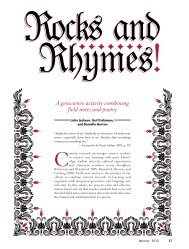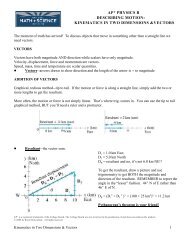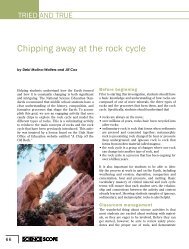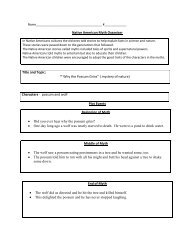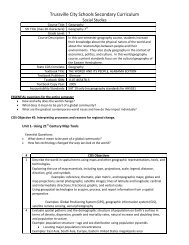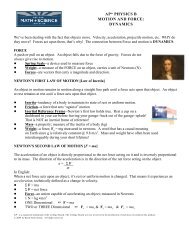The Gift of the Magi - Trussville City Schools
The Gift of the Magi - Trussville City Schools
The Gift of the Magi - Trussville City Schools
You also want an ePaper? Increase the reach of your titles
YUMPU automatically turns print PDFs into web optimized ePapers that Google loves.
<strong>The</strong> <strong>Gift</strong> <strong>of</strong> <strong>the</strong> <strong>Magi</strong><br />
by O. Henry<br />
All new material ©2010 Enotes.com Inc. or its Licensors. All Rights Reserved.<br />
No portion may be reproduced without permission in writing from <strong>the</strong> publisher.<br />
For complete copyright information please see <strong>the</strong> online version <strong>of</strong> this text at<br />
http://www.enotes.com/gift-magi-text
Table <strong>of</strong> Contents<br />
Notes.....................................................................................................................................................................1<br />
Reading Pointers For Sharper Insights............................................................................................................2<br />
<strong>The</strong> <strong>Gift</strong> <strong>of</strong> <strong>the</strong> <strong>Magi</strong>...........................................................................................................................................3<br />
i
Notes<br />
What is a literary classic and why are <strong>the</strong>se classic works important to <strong>the</strong> world?<br />
A literary classic is a work <strong>of</strong> <strong>the</strong> highest excellence that has something important to say about life and/or <strong>the</strong><br />
human condition and says it with great artistry. A classic, through its enduring presence, has withstood <strong>the</strong> test<br />
<strong>of</strong> time and is not bound by time, place, or customs. It speaks to us today as forcefully as it spoke to people<br />
one hundred or more years ago, and as forcefully as it will speak to people <strong>of</strong> future generations. For this<br />
reason, a classic is said to have universality.<br />
O. Henry is <strong>the</strong> pen name <strong>of</strong> William Sydney Porter, who was born in Greensboro, NC, on September 11,<br />
1862. He did not receive a formal education and, at twenty years <strong>of</strong> age, moved to Texas, where he worked on<br />
a sheep ranch.<br />
In 1887, he married Athol Estes Roach, supposedly <strong>the</strong> model for Della in “<strong>The</strong> <strong>Gift</strong> <strong>of</strong> <strong>the</strong> <strong>Magi</strong>,” O. Henry's<br />
most popular story; <strong>the</strong>y had two children, a daughter and a son. A year later, he obtained a job at a bank, but<br />
was accused <strong>of</strong> embezzlement and served time in Ohio Penitentiary. However, it was this imprisonment that<br />
led directly to O. Henry's career as a writer; in 1902, after three years in prison, he settled in New York with<br />
his new name and nearly a dozen short stories ready to be published.<br />
For three years, O. Henry wrote short stories every week for <strong>the</strong> World, a New York newspaper. Cabbages<br />
and Kings, his first collection <strong>of</strong> short stories, was published in 1904. <strong>The</strong>se stories became extremely popular<br />
throughout <strong>the</strong> United States, and O. Henry's next book, <strong>The</strong> Four Million, cemented his reputation as a vivid<br />
portrayer <strong>of</strong> life in New York <strong>City</strong>. However, his personal life was destroyed by a failed marriage, bad<br />
financial dealings, and heavy drinking. O. Henry died <strong>of</strong> complications due to alcoholism, penniless, on June<br />
5, 1910.<br />
<strong>The</strong> derivation <strong>of</strong> his pseudonym is unclear: It may be related to a family cat, <strong>the</strong> name <strong>of</strong> <strong>the</strong> prison warden,<br />
or a name in a book he read in jail.<br />
Notes 1
Reading Pointers For Sharper Insights<br />
As you read this collection <strong>of</strong> <strong>the</strong> best <strong>of</strong> O. Henry's short stories, keep <strong>the</strong> following points in mind:<br />
Surprise Endings<br />
• <strong>The</strong> endings, while unexpected, always seem appropriate to <strong>the</strong> characters.<br />
• <strong>The</strong> surprise ending usually shows O. Henry's philosophy about America: Wrongs are made right, <strong>the</strong><br />
villains are punished, and <strong>the</strong> good are rewarded.<br />
• Hints that point toward <strong>the</strong> climax are inevitably provided throughout <strong>the</strong> story.<br />
• <strong>The</strong> use <strong>of</strong> coincidences in <strong>the</strong> stories helps make <strong>the</strong> endings more plausible, but may also make <strong>the</strong><br />
plot seem overly manipulated, just to achieve <strong>the</strong> surprise.<br />
<strong>The</strong> Depiction <strong>of</strong> Poverty and Wealth<br />
Settings<br />
• Having no money is not indicative <strong>of</strong> being poor.<br />
• <strong>The</strong>re is a kind <strong>of</strong> nobility, even in <strong>the</strong> most poverty-stricken lives.<br />
• For a few, one tragedy will lead to ano<strong>the</strong>r.<br />
• O. Henry usually portrays poverty sympa<strong>the</strong>tically and condemns <strong>the</strong> forces that cause it.<br />
• Money is no barrier when it comes to love.<br />
New York <strong>City</strong> and its surroundings near <strong>the</strong> beginning <strong>of</strong> <strong>the</strong> 20th •<br />
century<br />
• Texas, or <strong>the</strong> West, at <strong>the</strong> turn <strong>of</strong> <strong>the</strong> century<br />
Characters<br />
Style<br />
Love<br />
• ordinary people in menial jobs struggling to survive<br />
• con men who derive <strong>the</strong>ir income from swindling innocent victims<br />
• people, both rich and poor, caught up by circumstances beyond <strong>the</strong>ir control<br />
• O. Henry's sympa<strong>the</strong>tic portrayal <strong>of</strong> his characters<br />
• immigrants or first-generation Americans<br />
• <strong>the</strong> underdog<br />
• self-sacrificing heroes<br />
• dialects and slang<br />
• digressions and asides to <strong>the</strong> reader<br />
• <strong>the</strong> use <strong>of</strong> simile, metaphor, personification, and allusion<br />
• puns, malapropisms, and excessive vocabulary used for humor<br />
• ligh<strong>the</strong>artedness and sensitivity<br />
• If love is even slightly dishonest, it will fail.<br />
• Love is available to everyone.<br />
• True love is more valuable than money and will conquer nearly any evil.<br />
• Love is frequently unexpected.<br />
Reading Pointers For Sharper Insights 2
<strong>The</strong> <strong>Gift</strong> <strong>of</strong> <strong>the</strong> <strong>Magi</strong><br />
ONE DOLLAR AND eighty-seven cents. That was all. And sixty cents <strong>of</strong> it was in pennies. Pennies saved<br />
one and two at a time by bulldozing <strong>the</strong> grocer and <strong>the</strong> vegetable man and <strong>the</strong> butcher until one's cheeks<br />
burned with <strong>the</strong> silent imputation <strong>of</strong> parsimony that such close dealing implied. Three times Della counted it.<br />
One dollar and eighty-seven cents. And <strong>the</strong> next day would be Christmas.<br />
<strong>The</strong>re was clearly nothing to do but flop down on <strong>the</strong> shabby little couch and howl. So Della did it. Which<br />
instigates <strong>the</strong> moral reflection that life is made up <strong>of</strong> sobs, sniffles, and smiles, with sniffles predominating.<br />
While <strong>the</strong> mistress <strong>of</strong> <strong>the</strong> home is gradually subsiding from <strong>the</strong> first stage to <strong>the</strong> second, take a look at <strong>the</strong><br />
home. A furnished flat at $8 per week. It did not exactly beggar description, but it certainly had that word on<br />
<strong>the</strong> lookout for <strong>the</strong> mendicancy squad.<br />
In <strong>the</strong> vestibule below was a letter-box into which no letter would go, and an electric button from which no<br />
mortal finger could coax a ring. Also appertaining <strong>the</strong>reunto was a card bearing <strong>the</strong> name “Mr. James<br />
Dillingham Young.” <strong>The</strong> “Dillingham” had been flung to <strong>the</strong> breeze during a former period <strong>of</strong> prosperity<br />
when its possessor was being paid $30 per week. Now, when <strong>the</strong> income was shrunk to $20, <strong>the</strong> letters <strong>of</strong><br />
“Dillingham” looked blurred, as though <strong>the</strong>y were thinking seriously <strong>of</strong> contracting to a modest and<br />
unassuming D. But whenever Mr. James Dillingham Young came home and reached his flat above he was<br />
called “Jim” and greatly hugged by Mrs. James Dillingham Young, already introduced to you as Della.<br />
Which is all very good.<br />
Della finished her cry and attended to her cheeks with <strong>the</strong> powder rag. She stood by <strong>the</strong> window and looked<br />
out dully at a grey cat walking a grey fence in a grey backyard. Tomorrow would be Christmas Day, and she<br />
had only $1.87 with which to buy Jim a present. She had been saving every penny she could for months, with<br />
this result. Twenty dollars a week doesn't go far. Expenses had been greater than she had calculated. <strong>The</strong>y<br />
always are. Only $1.87 to buy a present for Jim. Her Jim. Many a happy hour she had spent planning for<br />
something nice for him. Something fine and rare and sterling—something just a little bit near to being worthy<br />
<strong>of</strong> <strong>the</strong> honor <strong>of</strong> being owned by Jim.<br />
<strong>The</strong>re was a pier-glass between <strong>the</strong> windows <strong>of</strong> <strong>the</strong> room. Perhaps you have seen a pier-glass in an $8 flat. A<br />
very thin and very agile person may, by observing his reflection in a rapid sequence <strong>of</strong> longitudinal strips,<br />
obtain a fairly accurate conception <strong>of</strong> his looks. Della, being slender, had mastered <strong>the</strong> art.<br />
Suddenly she whirled from <strong>the</strong> window and stood before <strong>the</strong> glass. Her eyes were shining brilliantly, but her<br />
face had lost its color within twenty seconds. Rapidly she pulled down her hair and let it fall to its full length.<br />
Now, <strong>the</strong>re were two possessions <strong>of</strong> <strong>the</strong> James Dillingham Youngs in which <strong>the</strong>y both took a mighty pride.<br />
One was Jim's gold watch that had been his fa<strong>the</strong>r's and his grandfa<strong>the</strong>r's. <strong>The</strong> o<strong>the</strong>r was Della's hair. Had <strong>the</strong><br />
Queen <strong>of</strong> Sheba lived in <strong>the</strong> flat across <strong>the</strong> airshaft, Della would have let her hair hang out <strong>the</strong> window some<br />
day to dry just to depreciate Her Majesty's jewels and gifts. Had King Solomon been <strong>the</strong> janitor, with all his<br />
treasures piled up in <strong>the</strong> basement, Jim would have pulled out his watch every time he passed, just to see him<br />
pluck at his beard from envy.<br />
So now Della's beautiful hair fell about her, rippling and shining like a cascade <strong>of</strong> brown waters. It reached<br />
below her knee and made itself almost a garment for her. And <strong>the</strong>n she did it up again nervously and quickly.<br />
Once she faltered for a minute and stood still while a tear or two splashed on <strong>the</strong> worn red carpet.<br />
<strong>The</strong> <strong>Gift</strong> <strong>of</strong> <strong>the</strong> <strong>Magi</strong> 3
On went her old brown jacket; on went her old brown hat. With a whirl <strong>of</strong> skirts and with <strong>the</strong> brilliant sparkle<br />
still in her eyes, she fluttered out <strong>the</strong> door and down <strong>the</strong> stairs to <strong>the</strong> street.<br />
Where she stopped <strong>the</strong> sign read: “Mme. S<strong>of</strong>ronie. Hair Goods <strong>of</strong> All Kinds.” One flight up Della ran, and<br />
collected herself, panting. Madame, large, too white, chilly, hardly looked <strong>the</strong> “S<strong>of</strong>ronie.”<br />
“Will you buy my hair?” asked Della.<br />
“I buy hair,” said Madame. “Take yer hat <strong>of</strong>f and let's have a sight at <strong>the</strong> looks <strong>of</strong> it.”<br />
Down rippled <strong>the</strong> brown cascade. “Twenty dollars,” said Madame, lifting <strong>the</strong> mass with a practised hand.<br />
“Give it to me quick,” said Della.<br />
Oh, and <strong>the</strong> next two hours tripped by on rosy wings. Forget <strong>the</strong> hashed metaphor. She was ransacking <strong>the</strong><br />
stores for Jim's present.<br />
She found it at last. It surely had been made for Jim and no one else. <strong>The</strong>re was no o<strong>the</strong>r like it in any <strong>of</strong> <strong>the</strong><br />
stores, and she had turned all <strong>of</strong> <strong>the</strong>m inside out. It was a platinum fob chain simple and chaste in design,<br />
properly proclaiming its value by substance alone and not by meretricious ornamentation—as all good things<br />
should do. It was even worthy <strong>of</strong> <strong>The</strong> Watch. As soon as she saw it she knew that it must be Jim's. It was like<br />
him. Quietness and value—<strong>the</strong> description applied to both. Twenty-one dollars <strong>the</strong>y took from her for it, and<br />
she hurried home with <strong>the</strong> 87 cents. With that chain on his watch Jim might be properly anxious about <strong>the</strong><br />
time in any company. Grand as <strong>the</strong> watch was, he sometimes looked at it on <strong>the</strong> sly on account <strong>of</strong> <strong>the</strong> old<br />
lea<strong>the</strong>r strap that he used in place <strong>of</strong> a chain.<br />
When Della reached home her intoxication gave way a little to prudence and reason. She got out her curling<br />
irons and lighted <strong>the</strong> gas and went to work repairing <strong>the</strong> ravages made by generosity added to love. Which is<br />
always a tremendous task, dear friends—a mammoth task.<br />
Within forty minutes her head was covered with tiny, close-lying curls that made her look wonderfully like a<br />
truant schoolboy. She looked at her reflection in <strong>the</strong> mirror long, carefully, and critically.<br />
“If Jim doesn't kill me,” she said to herself, “before he takes a second look at me, he'll say I look like a<br />
Coney Island chorus girl. But what could I do—oh! what could I do with a dollar and eighty-seven cents?”<br />
At 7 o'clock <strong>the</strong> c<strong>of</strong>fee was made and <strong>the</strong> frying-pan was on <strong>the</strong> back <strong>of</strong> <strong>the</strong> stove hot and ready to cook <strong>the</strong><br />
chops.<br />
Jim was never late. Della doubled <strong>the</strong> fob chain in her hand and sat on <strong>the</strong> corner <strong>of</strong> <strong>the</strong> table near <strong>the</strong> door<br />
that he always entered. <strong>The</strong>n she heard his step on <strong>the</strong> stair away down on <strong>the</strong> first flight, and she turned white<br />
for just a moment. She had a habit for saying little silent prayers about <strong>the</strong> simplest everyday things, and now<br />
she whispered: “Please God, make him think I am still pretty.”<br />
<strong>The</strong> door opened and Jim stepped in and closed it. He looked thin and very serious. Poor fellow, he was only<br />
twenty-two—and to be burdened with a family! He needed a new overcoat and he was without gloves.<br />
Jim stopped inside <strong>the</strong> door, as immovable as a setter at <strong>the</strong> scent <strong>of</strong> quail. His eyes were fixed upon Della,<br />
and <strong>the</strong>re was an expression in <strong>the</strong>m that she could not read, and it terrified her. It was not anger, nor surprise,<br />
nor disapproval, nor horror, nor any <strong>of</strong> <strong>the</strong> sentiments that she had been prepared for. He simply stared at her<br />
fixedly with that peculiar expression on his face.<br />
<strong>The</strong> <strong>Gift</strong> <strong>of</strong> <strong>the</strong> <strong>Magi</strong> 4
Della wriggled <strong>of</strong>f <strong>the</strong> table and went for him.<br />
“Jim, darling,” she cried, “don't look at me that way. I had my hair cut <strong>of</strong>f and sold it because I couldn't have<br />
lived through Christmas without giving you a present. It'll grow out again—you won't mind, will you? I just<br />
had to do it. My hair grows awfully fast. Say ‘Merry Christmas!’ Jim, and let's be happy. You don't know<br />
what a nice—what a beautiful, nice gift I've got for you.”<br />
“You've cut <strong>of</strong>f your hair?” asked Jim, laboriously, as if he had not arrived at that patent fact yet even after<br />
<strong>the</strong> hardest mental labor.<br />
“Cut it <strong>of</strong>f and sold it,” said Della. “Don't you like me just as well, anyhow? I'm me without my hair, ain't<br />
I?”<br />
Jim looked about <strong>the</strong> room curiously.<br />
“You say your hair is gone?” he said, with an air almost <strong>of</strong> idiocy.<br />
“You needn't look for it,” said Della. “It's sold, I tell you—sold and gone, too. It's Christmas Eve, boy. Be<br />
good to me, for it went for you. Maybe <strong>the</strong> hairs <strong>of</strong> my head were numbered,” she went on with sudden<br />
serious sweetness, “but nobody could ever count my love for you. Shall I put <strong>the</strong> chops on, Jim?”<br />
Out <strong>of</strong> his trance Jim seemed quickly to wake. He enfolded his Della. For ten seconds let us regard with<br />
discreet scrutiny some inconsequential object in <strong>the</strong> o<strong>the</strong>r direction. Eight dollars a week or a million a<br />
year—what is <strong>the</strong> difference? A ma<strong>the</strong>matician or a wit would give you <strong>the</strong> wrong answer. <strong>The</strong> magi brought<br />
valuable gifts, but that was not among <strong>the</strong>m. This dark assertion will be illuminated later on.<br />
Jim drew a package from his overcoat pocket and threw it upon <strong>the</strong> table.<br />
“Don't make any mistake, Dell,” he said, “about me. I don't think <strong>the</strong>re's anything in <strong>the</strong> way <strong>of</strong> a haircut or a<br />
shave or a shampoo that could make me like my girl any less. But if you'll unwrap that package you may see<br />
why you had me going a while at first.”<br />
White fingers and nimble tore at <strong>the</strong> string and paper. And <strong>the</strong>n an ecstatic scream <strong>of</strong> joy; and <strong>the</strong>n, alas! a<br />
quick feminine change to hysterical tears and wails, necessitating <strong>the</strong> immediate employment <strong>of</strong> all <strong>the</strong><br />
comforting powers <strong>of</strong> <strong>the</strong> lord <strong>of</strong> <strong>the</strong> flat.<br />
For <strong>the</strong>re lay <strong>The</strong> Combs—<strong>the</strong> set <strong>of</strong> combs, side and back, that Della had worshipped long in a Broadway<br />
window. Beautiful combs, pure tortoise shell, with jewelled rims—just <strong>the</strong> shade to wear in <strong>the</strong> beautiful<br />
vanished hair. <strong>The</strong>y were expensive combs, she knew, and her heart had simply craved and yearned over <strong>the</strong>m<br />
without <strong>the</strong> least hope <strong>of</strong> possession. And now, <strong>the</strong>y were hers, but <strong>the</strong> tresses that should have adorned <strong>the</strong><br />
coveted adornments were gone.<br />
But she hugged <strong>the</strong>m to her bosom, and at length she was able to look up with dim eyes and a smile and say:<br />
“My hair grows so fast, Jim!”<br />
And <strong>the</strong>m Della leaped up like a little singed cat and cried, “Oh, oh!”<br />
Jim had not yet seen his beautiful present. She held it out to him eagerly upon her open palm. <strong>The</strong> dull<br />
precious metal seemed to flash with a reflection <strong>of</strong> her bright and ardent spirit.<br />
<strong>The</strong> <strong>Gift</strong> <strong>of</strong> <strong>the</strong> <strong>Magi</strong> 5
“Isn't it a dandy, Jim? I hunted all over town to find it. You'll have to look at <strong>the</strong> time a hundred times a day<br />
now. Give me your watch. I want to see how it looks on it.”<br />
Instead <strong>of</strong> obeying, Jim tumbled down on <strong>the</strong> couch and put his hands under <strong>the</strong> back <strong>of</strong> his head and smiled.<br />
“Dell,” said he, “let's put our Christmas presents away and keep ’em a while. <strong>The</strong>y're too nice to use just at<br />
present. I sold <strong>the</strong> watch to get <strong>the</strong> money to buy your combs. And now suppose you put <strong>the</strong> chops on.”<br />
<strong>The</strong> magi, as you know, were wise men—wonderfully wise men—who brought gifts to <strong>the</strong> Babe in <strong>the</strong> manger.<br />
<strong>The</strong>y invented <strong>the</strong> art <strong>of</strong> giving Christmas presents. Being wise, <strong>the</strong>ir gifts were no doubt wise ones, possibly<br />
bearing <strong>the</strong> privilege <strong>of</strong> exchange in case <strong>of</strong> duplication. And here I have lamely related to you <strong>the</strong> uneventful<br />
chronicle <strong>of</strong> two foolish children in a flat who most unwisely sacrificed for each o<strong>the</strong>r <strong>the</strong> greatest treasures <strong>of</strong><br />
<strong>the</strong>ir house. But in a last word to <strong>the</strong> wise <strong>of</strong> <strong>the</strong>se days let it be said that <strong>of</strong> all who give gifts <strong>the</strong>se two were<br />
<strong>the</strong> wisest. Of all who give and receive gifts, such as <strong>the</strong>y are wisest. Everywhere <strong>the</strong>y are wisest. <strong>The</strong>y are <strong>the</strong><br />
magi.<br />
<strong>The</strong> <strong>Gift</strong> <strong>of</strong> <strong>the</strong> <strong>Magi</strong> 6



